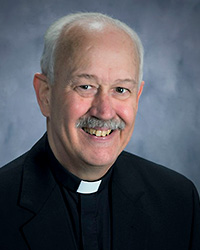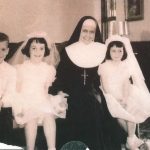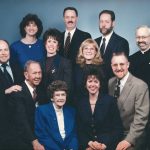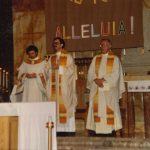Meet Father Dennis Noelke, CSB
I’ve had to grow into particular roles. No amount of schooling can prepare you for hearing confessions for the first time or how to lead a school during a crisis. Along the way, I’ve always had Basilians give advice and share their experiences.
Father Dennis Noelke’s, CSB priestly ministry has spanned parish work, high school teaching and administration, campus ministry, and vocations. He rose to the challenges presented by each appointment. “I’ve had to grow into particular roles. No amount of schooling can prepare you for hearing confessions for the first time or how to lead a school during a crisis. Along the way, I’ve always had Basilians give advice and share their experiences,” he said.
Father Dennis Noelke, CSB was raised in in a Catholic family in Detroit, Michigan with his two older brothers and two younger sisters by his parents, Paul and Elizabeth. While he doesn’t remember praying together as a family on a regular basis, his parents insisted that that they attend Mass on Sundays and Holy Days and that each of their children attend Catholic school, despite the great expense to the family.
Dennis attended the Basilian-run Detroit Catholic Central and after school he worked at the Basilian residence. He was responsible for answering the telephone and often the Basilian residents would stop and chat. Through this experience, Dennis was able to interact with and get to know the priests outside of the classroom. He realized that although they were deeply religious, they were also ordinary people who were down to earth and rooted in the real world.
He knew early on that he wanted to be a teacher and in high school the idea becoming a teacher-priest entered the picture. In university he joined the Basilian associate program to understand more about what it meant to be a priest. He graduated with a bachelor of math and psychology from Mercy College of Detroit (now University of Detroit Mercy) and the thought of becoming a priest had stayed with him.
After graduation he entered the Basilian novitiate in Rochester, New York with two others. While he and his novitiate classmates didn’t always see eye-to-eye, the year was full of fun experiences and the three remain friends today.
After taking his first vows in August 1976, he spent a year teaching math and theology at Aquinas Institute in Rochester as a scholastic. His studies had prepared him for teaching math, but theology was another story as he had not yet begun his theology studies. He describes the experience as, “teaching before I had been taught.” Luckily, he lived with two Basilian priests who were teaching the same course and they were able to provide him with course materials. It was important to him that students were able to interact with him outside the classroom, as he had found his high school experience was instrumental in him becoming a priest. He could relate to students by attending sports games and cheering for the school’s teams.
In September 1977, he began his theology studies at St. Basil’s College in Toronto, Ontario. He was studying theology in the wake of the Second Vatican Council and it was an exciting time to be surrounded by Basilian scholastics and students for the priesthood from other religious communities and diocese, as well as religious women and lay men and women. As a deacon, he served in campus ministry at the University of St. Thomas, Houston, Texas. He was ordained to the priesthood on May 9, 1981 at Our Lady of the Assumption Church in Windsor, Ontario.
His first appointment as a priest continued his work in campus ministry at St. Thomas. A noticeable difference from teaching high school was the smaller age gap between him and the students. “It felt like they were my younger brothers and sisters,” he said. In this role he got to know many people on campus and went on to marry quite a few of them.
In 1983, Father Bud Paré, CSB, superior general, appointed him to be the Congregation’s vocation director. He lived in Rochester, New York while he traveled around Canada and the United States to speak about and promote vocations to the Congregation, which gave him the opportunity to meet a lot of Basilians that he may never otherwise have the opportunity to meet. “It was a privilege to meet all of these people who were doing different and interesting things,” he said, “I was made to feel very comfortable everywhere I stayed. No matter where I went, it always felt like I was home.”
In 1987, he returned to Aquinas Institute as teacher and chaplain and in 1992, he was appointed the school’s principal.
He returned to campus ministry at the university level in 1995 at Assumption University in Windsor, Ontario. During this time, the Archdiocese in Detroit had asked the Basilians to take over Holy Redeemer High School, an underperforming school in the archdiocese. Father Noelke was on the committee to consider this proposal. Along with the committee’s findings, Father Noelke indicated that if the Basilians did take over administration, he would like to be assigned there. In 1999, he was appointed the school’s assistant principal. The school was in a poorer neighbourhood and many of its students never had a family member go on to attend university. After a couple of years under Basilian administration, the school’s record started to turn around.
“The students were from different backgrounds from what I was used to, and it was hard work, but I absolutely loved it,” he said. However, as the administration was getting ready to launch a capital campaign to raise funds, the archdiocese closed the school for financial reasons.
After a sabbatical, he was appointed to his alma mater, Catholic Central, but was there for only half a year before he was named the Congregation’s secretary/treasurer general. Despite not having a business background, he was assured that he would be able to do the job. He was able to rely on expertise of the lay office staff for help when needed. In this role, he enjoyed spending time with the retired Basilians living in the Cardinal Flahiff Centre above the Curial Office.
Afterwards, he ministered in the parish apostolate at St. Kateri Tekakwitha Parish in Rochester, New York. He was accompanying people who were sick in the hospital and counselling people who were struggling in their marriages. These situations were a completely different dynamic from working with students and their parents about academics.
In 2014, he returned to the high school apostolate and served as principal of Detroit Catholic Central. “It had been 45 years since I graduated and it was still the same place. It was different location, but it was the Catholic Central I knew and loved,” he said. “The school was successful in many ways: academically, athletically, musically, as well as spiritually. As an administrator, I got a lot of the credit for the school’s success, whether I earned it or not,” he said. In this role he would encourage students to be the best they could be.
In 2018, he was elected to the Congregation’s general council and retired as principal of Catholic Central. He remains involved in the school’s Chaplaincy and retreat programs.





